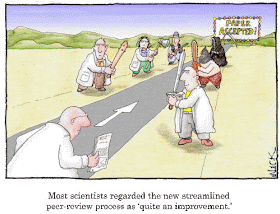I'm not the only one with a dim view of the value of edited volumes. As I've expressed previously ("
Why are so many edited volumes worthless?") most edited volumes in archaeology are insufficiently integrated, have too many poor quality essays, and do a poor job of advancing research. I was thus not surprised to find the following comments in a recent book review published in the Journal of the Royal Anthropological Institute. This was a review of "
Comparing Cities: the Middle East and South Asia" (ed. by Ali and Rieker, Oxford Univ press, 2010. Review 2011, JRAI 17:671-672); review by Hayder Al-Mohammad:
"one is left to wonder what this edited volume is hoping to respond to or push in terms of new resesarch, ideas, and methods." (p.671)
"
Comparing Cities should be a warning to future editors of volumes that readers require more than just a number of articles thrown together in one book to make it a worthy and coherent read." (p.672)
Well, I an dubious about whether the poor quality of any single edited
volume will serve as a warning for future volume editors. If so, the
genre of poor edited volume would not still be flourishing.
Unfortunately the kind of quality control shown in the cartoon above is typically absent from the evaluation of edited volumes by publishers. Maybe if we
had more tough-looking reviewers armed with swords and chainsaws, and fewer pussycats armed with badminton rackets, the quality of
archaeological edited volumes might improve.
Here are my older posts on edited volumes:


Do you think that the dynamic between editor and contributors is vital? Let's say that editor has a unique view that integrates and creates a real contribution, even if minor. However, she or he can't get the contributors to get in line and follow the thematic structure and ask the questions the volume is trying to ask. The editor, let's say, is a new PhD with little status or power to get everyone in check. Should the volume be abandoned? Or should the editor just go through and hope for the best? Inquiring minds....
ReplyDeleteIts hard to make a recommendation without much context. Important considerations are: (1) what stage is the project at? How much work would it be to complete the project, even if it is not an ideal produce. (2) Would this be a useful contribution even if not strongly integrated? That is, are the papers good, do you have known authors who will attract readers and buyers, is the topic popular, etc. (3) How many of the contributors might go along with some kind of guidance or shaping of their contributions? This depends on their buy-in to the project, their degree of business/laziness, the congeniality of your scheme, etc.
ReplyDeleteMy gut reaction, without knowing these things, would be to do the paper as a journal article. Emphasize the general or programmatic aspects (that is, not just a case study with a new idea or 2), and then use that as a basis to recruit for a symposium or volume. In most cases I know, good integration in an edited volume pretty much has to begin at the start, before anyone agrees to participate. It is perfectly reasonable to tell potential contributors that you want people to use a particular concept or approach or structure, and if they don't find that a useful thing to do, then you are not interested in their participation (say it in a more diplomatic way). And it is MUCH easier to do that if you have a completed paper (an article, or something in press) that shows what you want.
There will always be people who are easier to work with and those who are more difficult. When Mary Hodge and I were putting together the session that was to be published as Economies and Polities in the Aztec Realm, Cathy Costin's scheme for the analysis of craft production/specialization was new. We told all authors who dealt with crafts to use her concepts. One author was insulted: how dare you tell me what concepts to use! So it is good to know something about the level of buy-in, crankiness, and flexibility of the authors.